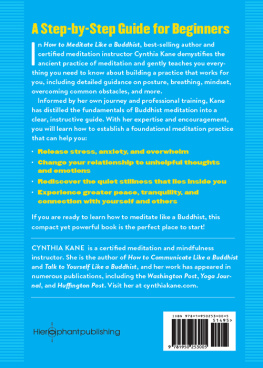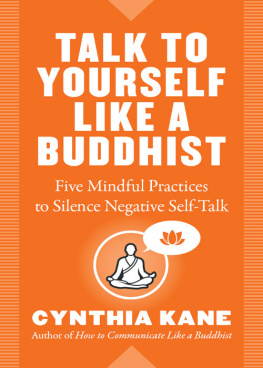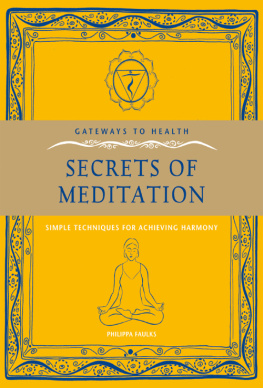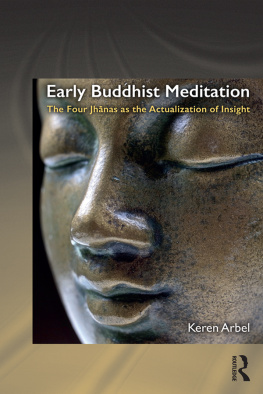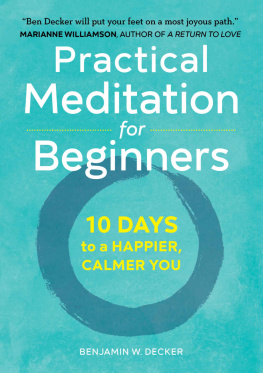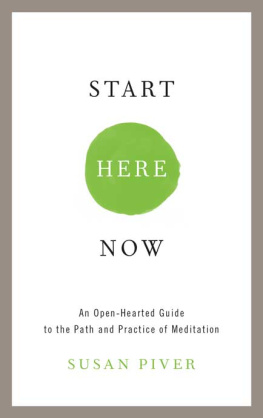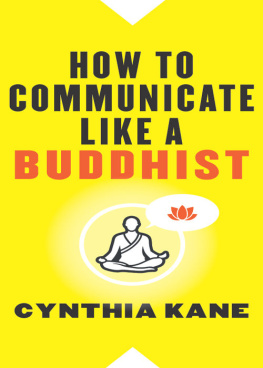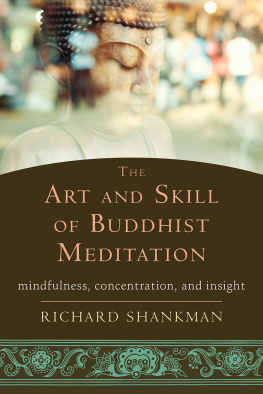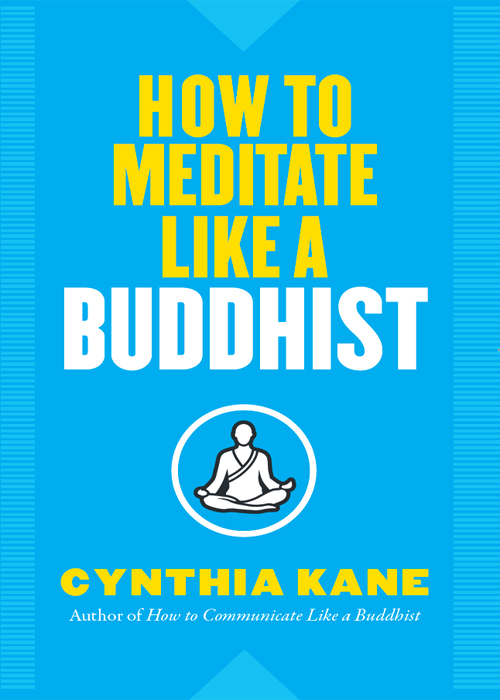
HOW TO
MEDITATE
LIKE A
BUDDHIST
HOW TO
MEDITATE
LIKE A
BUDDHIST
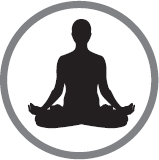
CYNTHIA KANE

Copyright 2020 by Cynthia Kane
Cover design by Emma Smith
Cover art by Steinar | Shutterstock
Hierophant Publishing
www.hierophantpublishing.com
Library of Congress Control Number: 2019957480
ISBN: 978-1-950253-00-5
Print book interior design by Frame25 Productions
Illustrations by Chathuri_suga
Stories at the opening of each chapter are taken from
either 101 Zen Stones (Rider and Company, 1919), Zen
Flesh and Zen Bones, A Collection of Zen and Pre-Zen Writings
(Anchor 1961), or otherwise appear in the public domain.
www.redwheelweiser.com
www.redwheelweiser.com/newsletter
For those wanting to live with ease.
By the practice of meditation, you will find that you are
carrying within your heart a portable paradise.
Paramahansa Yogananda
Contents
Introduction
Have you ever felt anxious, disconnected, or overwhelmed, like you're constantly running from one thing to the next? In the modern world, with so many activities and responsibilities, each completed task often opens up new obligations, leaving little time for anything else. For many, this persistent lack of silence, space, or personal time can lead to a life filled with stress, worry, or even resentment.
There are, of course, periods of stress in everyone's lives from time to time; but when stress becomes chronic and normal, we can easily get to the place where it seems like life is running us rather than the other way around. The result can be a drain on our health and vitality, a lack of time and attention with the people we love the most (including ourselves!), and a cloud that hangs over our lives and obscures our perception of reality.
If you have felt any or all of this, let me start by telling you that I've been there, too. Years ago, my stress and anxiety were so bad they used to wake me up in the middle of the night, my mind racing with all the things I had to do each day and imagining the worst-case scenarios for all of them. Sometimes it felt like my tongue was swelling up in my mouth and I couldn't breathe. I thought something was wrong with me. After all, I had tried everything I could think of to fix what wasn't working in my life. I tried changing myself, my work, and my relationships; I moved cities and switched careers; I would adjust my schedule and lessen my responsibilities. But no matter what I changed, my sense of being overwhelmed stayed constant. It wasn't long before I concluded that there simply had to be something broken in me at a fundamental level. I became certain that I would never experience the kind of peace, presence, and purpose I so desperately craved and that I often saw in others.
Then, in February 2011, tragedy struck. Mauricio, my first love, died while kayaking down a river in Costa Rica, when he got caught in a swell. The moment I found out, I felt like my limbs were pinned to a surface. I couldn't move; I had no control over my body. The news left me exposed, broken open, and vulnerable. The pain was unbearable, and nothing I did seemed to make any difference. I could barely eat or sleep. Even when I could physically move again, I found there was no position, no activity, and no thought that could give me any relief. On the plane to Costa Rica with nothing to do but think, my mind swirled in a frenzy that seemed to call up every thought and emotion I had ever had. Like a hurricane picking up everything it touches and tossing it somewhere else, leaving destruction in its wake, I focused obsessively on death, life, love, meaning, work, fear, loss, and back to death againa jumbled pile of thoughts I couldn't make sense of. I craved even a single moment of calm and wished that somethinganythingcould entice my crazy mind to take a break.
Mauricio's death had pushed my anxious thinking and fear to a new and now destructive level. My mind churned like a storm, despite all efforts to slow it down. In the days after his death, I tried distracting myself with music, movies, and computers, but all of this only seemed to make my anxiety worse. When I finally couldn't take it anymore, I started popping sleeping pills and drifted out of consciousness.
It wasn't long before those pills became more important to me than food. Even though I slept fourteen hours a day, I still felt exhausted during my waking hours. The hurricane in my mind continued and with it the thinking, wondering, and disbelief. My physical health began to deteriorate as well. Something had to change.
Maybe you believe, like I do, that some opportunity, a signal flag marking a new path, will often appear in your life when you need it most. Mine came in the form of a note from a friend a few weeks later, when she forwarded me an email about a writing and meditation workshop at the Shambhala Meditation Center of New York. I had never been to the place or even heard of it. But the idea of writing about my loss coupled with the meditation benefits they described felt like it might be a port in the storm for my hurricane mind.
That very first night at the Shambhala Center I began a meditation practice that, over time, would change my life. Today, I'm happy to report that I spend the vast majority of my days away from the path of the hurricane mind. I am calm, present, relaxed, joyful, and connected in a way I could only dream of before. And while I still have anxious and stressful moments, they are moments instead of daysand, most importantly, these feelings no longer paralyze or derail me. If you had told me eight years ago that I would find peace in my life, form deep connections with others, see beauty in the world, stop judging and evaluating myself constantly, and change my relationship to fear, death, stress, and anxiety, I would never have believed you. Yet, here I sit, writing this book to let you know that this is exactly what happened and that beginning a meditation practice was the cornerstone to this new way of life.
The impact on me was so profound that in no time I became a certified meditation and mindfulness instructor. And for those I work with, meditation has had similar benefits, helping ease their social anxiety, insomnia, and stress. I've seen meditation help people tap into their creativity, be more productive at work, and find overall well-being greater than they have ever felt before. I've seen marriages grow more intimate and loving and parents connect with their children and grow more peaceful within their families. I've seen people accomplish more with less effort, reduce their blood pressure, start sleeping better at night, and reset their relationship with food. Many say that they've started taking the worrisome thoughts that occur in their minds less seriously, which has created more joy, laughter, and adventure in their lives. Just imagine for a moment what any one of these benefits could mean for your life.
In addition to my own experience and that of my students, countless studies have measured the benefits of meditation on the body, mind, and spirit. In fact, it's difficult (if not impossible) to find a scientific study that hasn't concluded that meditation is good for you. A cursory internet search will deliver a variety of peer-reviewed studies showing physical, psychological, and spiritual results.
Next page
